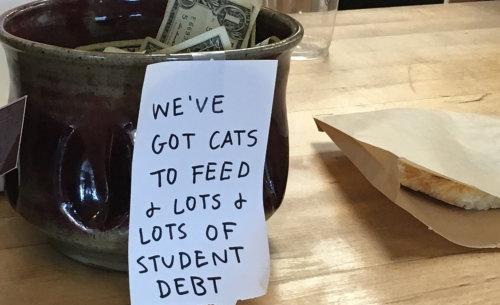The other day I was at Subway grabbing a sandwich when I overheard a guy questioning his wife as to whether he should leave a tip or not. It got me thinking
about the whole tipping situation and how it can be a bit confusing these days.
Everywhere you go, there's a tip jar or a digital device asking for a tip. It can feel a little overwhelming,
right?
Let's take a step back and explore the origins of tipping. Tipping started as a way to show appreciation for exceptional service, a voluntary "thank you" to those who went above and beyond their job requirements.
These days, tipping has become expected in certain industries. However, it's important to remember that while tipping is a very nice thing to do, and I highly encourage it when appropriate, it isn't mandatory in most
situations.
Here's my take on tipping:
When I visit places like restaurants, bars, or cafes,
or use specialized services like hair stylists, parking attendants, or taxi drivers, where employees rely heavily on tips, I almost always leave a tip. These folks often earn lower base wages, so tipping ensures they receive fair compensation for their service. For standard good service, I feel that leaving a tip is more than reasonable.
Exceptional service deserves a little extra recognition. When I receive outstanding service, I'm more than happy to leave a bigger tip than I would for standard service. It's a way to show my appreciation for going above and beyond.
On the other hand, in non-service-based industries like retail stores or grocery stores, or for professional services like electricians and accountants, tipping isn't necessary. They receive wages that account for their service, so there's no need to tip. However, if someone in these fields goes out of their way to help me, I might consider a small gesture of gratitude...like a heartfelt note or a gift card.
When it comes to unsatisfactory service, on the other hand, tipping is definitely off the table for me. If a store or service industry disappoints, I believe it's perfectly fine not to tip. In fact, in rare cases like these, I've even spoken with a store or restaurant supervisor about my experience, giving them the opportunity for improvement in the
future.
Some places already include a service charge or gratuity in the bill, and in those cases, an additional tip isn't necessary unless the service went above and beyond my expectations.
Now, what about tipping at Subway? In the case of quick-service chain restaurants like Subway, tipping is generally not expected. The employees receive regular wages, and the service is more transactional.
However, if the staff at Subway provides exceptional service, like accommodating a special request or creating a memorable experience, I think leaving a tip as a token of appreciation is a nice gesture.
But remember, it's not an obligation.
By the
way, some employees are not allowed (it's actually not legal) to accept tips. Some examples are flight attendants, mail carriers, Uber drivers (in some states), and police officers.
Tipping can definitely be a tricky thing to navigate, but understanding the underlying principles makes it
easier.
Remember, tipping is about expressing gratitude, not an obligatory task. Trust your judgment and tip with a smile when it feels right to you.












